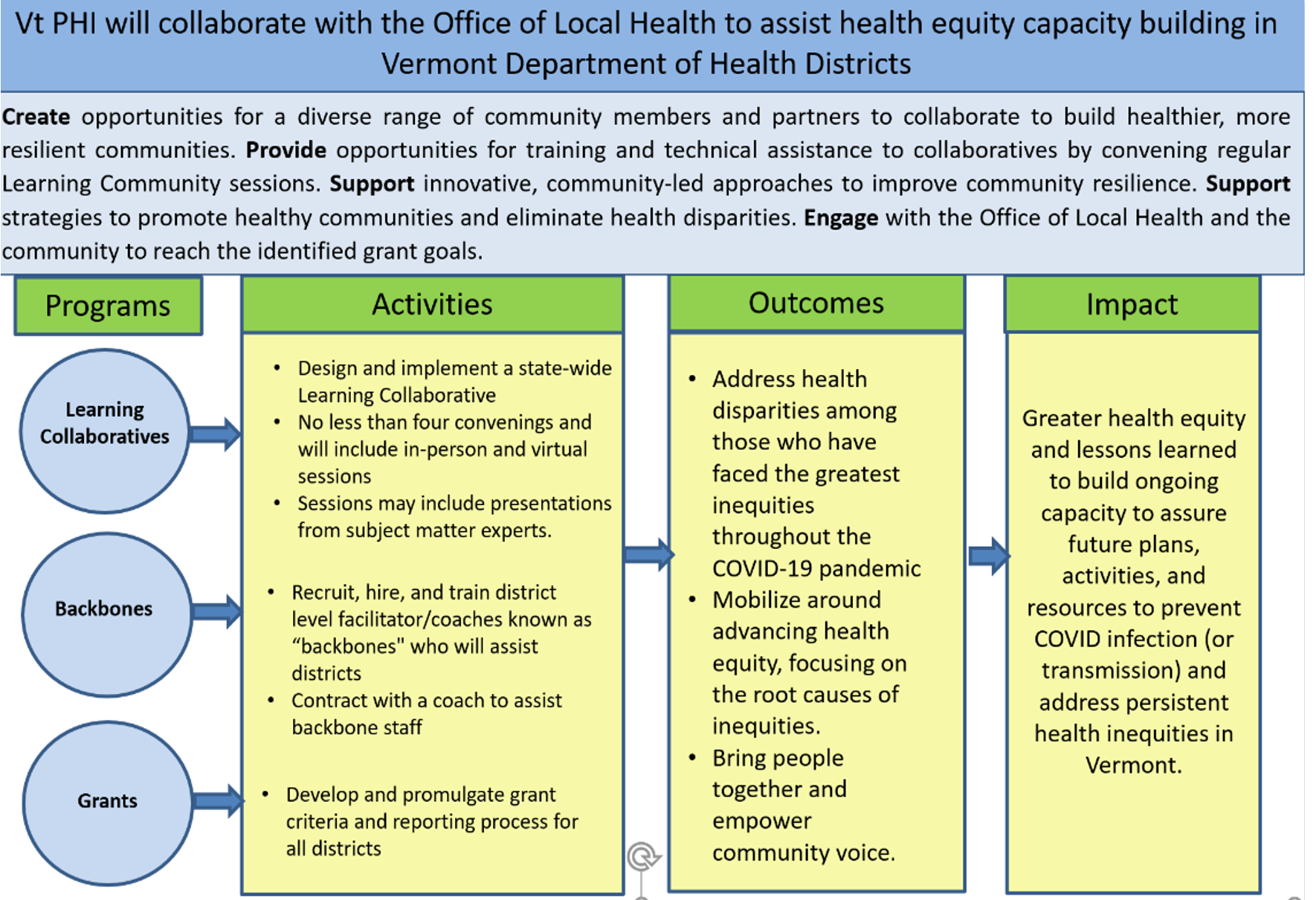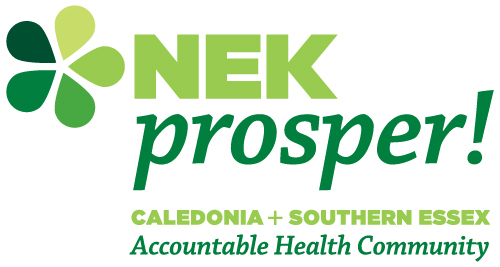
NEK Community Health Equity, Learning Collaboratives
Health Equity exists when all people have a fair and just opportunity to be healthy – especially those who have experienced socioeconomic disadvantage, historical injustice, and other avoidable systemic inequalities that are often associated with social categories of race, gender, ethnicity, social position, sexual orientation and disability.
- Vermont Department of Health (VDH) District Offices: St. Johnsbury and Newport
- District Director Leads: Heather Lindstrom (St. Johnsbury) and Justin “Tin” Barton-Caplin (Newport)
- Designated Regional Community Groups: NEK Prosper! (St. Johnsbury) and Vibrant ONE (Newport)
- Regional Backbone Organization: Northern Counties Health Care, Inc.
- Integrator: Kari White, Director of Community Health Equity
Learning Collaboratives
Learning collaboratives (also known as communities of practice, learning communities, learning networks, knowledge networks, and quality improvement collaboratives) bring teams of people together in a short-term, structured forum to create change and make improvements in a focused area. Collaboratives are built on social connectedness and shared learning in a way that supports both peer-to-peer learning and expert-to-peer learning.
The Action Learning Collaborative At-a-Glance (March 2022–May 2023):
-
Statewide learning and sharing through webinars and in-person trainings
- Shared library system for documentation and cross-referencing – Click here for instructions on how to access the webinar materials and recordings
- Facilitated local team meetings
- One-on-one coaching as needed
Goal: Provide information and resources to NEK Prosper! and the CANs to help build capacity to create a culture for equity.
Objectives:
- Address health disparities among those who have faced the greatest inequities throughout the COVID-19 pandemic.
- Mobilize around advancing health equity, focusing on the root causes of inequities.
- Bring people together and empower community voices.
1. Introduction to the VT Community Health Equity Partnership – March 29, 2022 – Slides and Notes
By the end of our time together, participants will be able to:
- Explain the purpose of the work led by the Vermont Public Health Institute under its contract with the Vermont Department of Health to reduce COVID-19-related health disparities.
- Understand the resources available to your collaborative under this grant.
- Evolve our collective awareness around how we define “health equity”.
Reflective Questions to Build Health Equity Capacity and Guide the Collaborative Process – Contribute in IdeaBoardz
- What is my hope for this work in your district?
- What might be the biggest risk (or your greatest fear) around this work in your district?
- What roadblocks do you think currently exist?
- Who Benefits? Through our design decisions and actions, who will most directly benefit and how will they benefit?
- Who Pays/Is Harmed? Will our approaches lead to any unintended consequences that can be mitigated?
- Who Leads? Will our methods increase leadership opportunities for BIPOC communities and other disproportionately impacted communities?
- Who Decides? In what ways can be we more transparent in how decisions get made? Will our actions create different ways of operating that place more choice in the hands of those with lived experience?
2. The Importance of Data: The Impact of COVID-19 on VT’s Vulnerable Populations – April 11, 2022 – Slides and Notes
By the end of our time together, participants will be able to:
- Describe what and how colleagues in two local VT Department of Health Districts have mined and learned from the data.
- Know where to look for national and state data to serve as comparisons for what you observe in your District.
- Describe the Health Equity Assessment Tool as well as how to use it in your District.
- Understand what other Districts are doing.
Session Questions:
- What is another voice(s) to invite into this work?
- What are your next steps?
- Find your district’s most recent hospital-led Community Health Needs Assessment (NVRH) and (North Country Hospital) and review it.
- Think about the different kinds of data you could use besides quantitative data (stories, 1st person narratives, literature, art, etc.).
3. Creating Health Equity in Vermont’s Communities: Building Partnerships through Engagement and Trust – May 12, 2022 – Notes (including links to Slides, Co-consulting engagement solutions and post-webinar reflections)
- Learn strategies for community engagement – making sure the right people are at the table
- Create a plan to engage community members
- Understand the 3 components of success: Process, Relationships and Results
- Understand the Vermont Community Health Equity Partnership grant components
Developing policies and procedures for the granting of stipends to individuals attending local collaboration meetings as well as virtual (and, potentially, in person) “All District” meetings. Stipends are intended for distribution to individuals who represent those with the most at stake in finding equitable solutions and aren’t paid to attend as part of their job.
- It is up to us to determine the process for distributing these stipends.
- We have examples of how other VT collaboratives have decided to do this.

